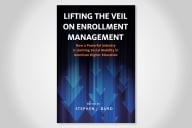You have /5 articles left.
Sign up for a free account or log in.
I open the newspaper to read about yet another sexual harassment scandal. So many have occurred in the past few months that the names are hard to keep track of at this point: Harvey Weinstein, Kevin Spacey, John Conyers, Al Franken, Louis C. K. …
One of the scandals hit especially close to home for me: it involved my former graduate school adviser and long-term collaborator, T. Florian Jaeger from the University of Rochester. Last year he was accused of sexual harassment in a highly publicized case. The discussion about it in the news media has touched upon issues of discrimination, ethics and inclusion in academe.
In the wake of such events, colleges and universities have put together ad-hoc committees to revise their policies, and major conferences have issued antiharassment statements and organized co-convening workshops to discuss the issues.
Yet something has though been consistently missing from the public discussion so far. What happens to the people who worked with those who’ve been accused?
This question is quite personal to me, as I am one of these people. I worked closely with Jaeger on a number of projects over the past eight years. Psycholinguistics is a highly collaborative discipline, and Jaeger, no matter what our feelings are, has been a highly prolific researcher with a wide network of collaborators.
In the months since the scandal broke, I’ve been pressured to address this part of my career in some way -- either to explain it or to keep quiet about it. After all, if I cite my papers from now on as “Fedzechkina et al., XXXX,” many people would not necessarily know that Jaeger is one of the et als.
I don’t have anything to explain: I had a successful working relationship with Jaeger, and I never experienced sexual harassment in all the years I spent in his lab. I cannot pretend that the past eight years of my life never happened. Nor do I want to.
That said, moving on has been difficult. Several colleagues have brought to my attention that researchers at different major universities are urging other academics to boycott citing Jaeger’s papers or requiring them as class readings. I took a liberty to go over his CV: by my count, out of 119 papers published so far -- not including completed but not yet published projects -- 106 (89 percent) are co-authored with other researchers. He has 91 different collaborators, most of whom are junior researchers like me, and many are women. It’s not just Jaeger’s career but also theirs that will be impacted by this boycott.
For example, a boycott of Jaeger’s papers would seriously hurt my career, as 87 percent of my publications to date are co-authored with him.
Current graduate students are impacted more strongly: the experience of having their papers boycotted has prompted some female graduate students to consider giving up an academic career path altogether and looking for nonacademic career options. Isn’t harming female researchers’ careers the opposite of what this boycott is trying to achieve?
Current students are affected in other ways, too. A graduate student told me that conference organizers hinted to them that Jaeger’s name wasn’t welcome on the conference program, leaving the student with the tough choice of either making an unethical decision -- removing a collaborator from the joint work -- or taking a career hit by pulling the already accepted talk from the conference.
On a separate occasion, I heard from a graduate student that they were considering withdrawing their talk from a major conference. After reading the public response to the Rochester events on social media, the student was worried that their work would be met with undue criticism simply because it happens to be co-authored with Jaeger. How can intimidating graduate students and forcing them to make impossible choices possibly be a solution to the problem we’re dealing with?
“Your career will take a short-term hit though these events, but you’ll be OK in the long run,” I’m often told. While I fail to see why my career should be affected by this to begin with, I have to agree on one thing: in the end, my career will probably be OK.
After all, I now run my own lab in a supportive department where I get to work with fantastic graduate students. But I can’t help thinking, what if this weren’t the case? I would be terrified if I were a current student in the Jaeger lab and depended on recommendation letters and publishing joint work necessary to get a faculty position in the short term. As a young faculty member who depends on graduate students, I would also seriously worry about my career if my lab were at the University of Rochester, in light of the recent open letter advising students not to attend this university.
Don’t get me wrong. I’m against any type of harassment and discrimination. I think it’s good for the higher education community to finally publicly discuss these issues. In the past months, we’ve talked a lot about how things went wrong at the University of Rochester and how profoundly disappointed we are with the university policies.
But let’s also talk about the people we often don’t talk about -- dozens of young investigators who are inadvertently involved -- and how we can make sure that their careers do not become collateral damage because of such events. We, as a community, need to publicly -- not in just private conversations -- assure such researchers that they are welcome and supported. We must make certain that the quality of their contribution to science will always be valued in its own right and not be diminished through these events. After all, the science was never questioned in the Jaeger case.
So let’s end the boycott on co-authors. Let’s make sure nobody is asked to make any more impossible choices. Let’s be what we are aiming for: a truly inclusive community.








